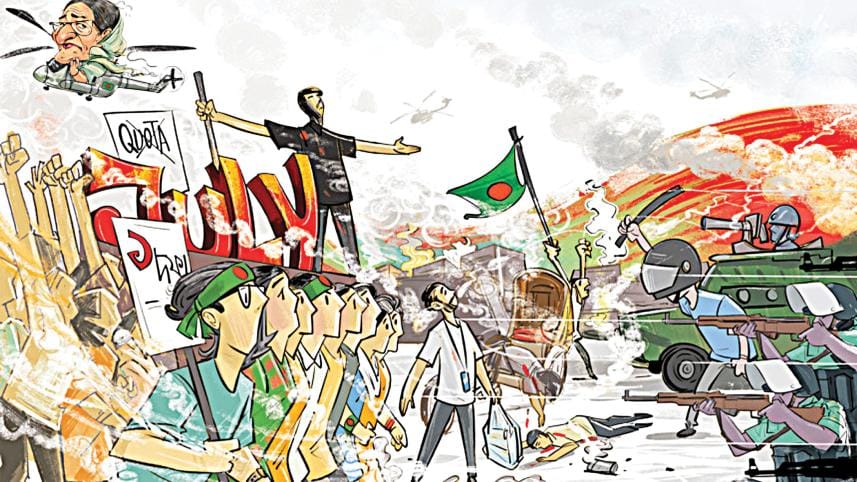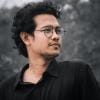July uprising: AL govt, oppositions used children as pawns

Both the previous government (Awami League) and opposition groups recruited, paid, and used children in violence during the July uprising, a United Nations Fact-Finding Mission has reported.
The UN report highlights how high school and madrasa students, young workers, and even street children were drawn into the protests, often with tragic consequences.
Children accounted for 12 to 13 percent of total fatalities, with at least 118 killed. Beyond deaths, security forces allegedly engaged in deliberate maiming, arbitrary arrests, torture, and inhumane detention of minors, breaching both national and international laws.
VIOLENCE AGAINST CHILDREN
Security forces reportedly used indiscriminate gunfire, including lethal ammunition, on child protesters in Dhaka's Azampur, Badda, Dhanmondi, Farmgate, Jatrabari, Mirpur, Mohammadpur, and Rampura areas, as well as in Gazipur, Narayanganj, Rangpur, and Sylhet.
The report cites several specific cases.
A 17-year-old student was shot in the head by police in Mohammadpur on July 19 while standing in a mixed crowd of demonstrators. The previous day, police in Dhanmondi killed another 17-year-old and fatally injured a 12-year-old with nearly 200 metal shot pellets.
Some victims were permanently disabled. A 16-year-old boy lost his leg after being struck by bullets and metal shots allegedly fired by the then ruling party supporters. A 17-year-old was left blind after police fired metal shots at demonstrators.
Even young children were not spared. In Narayanganj, a six-year-old girl was shot in the head while watching the clashes from her rooftop.
The UN report states that in multiple cases, security forces deliberately killed or maimed children, sometimes shooting at point-blank range. Protesters who were already injured and incapacitated were among those executed.
ARBITRARY ARRESTS, TORTURE AND FORCED CONFESSIONS
Children were not only victims of gunfire but also faced mass arrests, unlawful detentions, and torture. Many were held in police stations, the Detective Branch headquarters, and prisons alongside adults.
Some were reportedly tortured into making forced confessions.
In Rangpur, a 16-year-old boy was detained for 13 days on what the report describes as false charges related to the police killing of Abu Sayed.
In Dhaka, a 17-year-old was tortured at Jatrabari Police Station for two days to extract a confession for a police officer's murder before being transferred to DB headquarters, where the torture allegedly continued.
Despite his lawyer proving he was a minor, a judge sent him to an adult prison.
Following media pressure, he was transferred to a juvenile detention centre, where he remained until August 6 -- the day after Sheikh Hasina fled the country.
The report further accuses the DB at Minto Road and CTTC of engaging in incommunicado detention, torture, and other ill-treatment of minors.
Thousands of children were reportedly detained through warrantless home invasions, mass roundups, and street detentions, in clear violation of international law.
Meanwhile, the report states that they have received multiple allegations that the opposition paid children to bring them to the protests. However, they did not provide any separate examples to substantiate the claim.
Shahana Huda Ranjana, a senior coordinator at Manusher Jonno Foundation (MJF), criticised both the authorities and political factions for involving children in the violent uprising.
"The government used all its force to suppress the movement, and the casualty list shows that many of the victims were children," she said.
"But neither the movement to abolish quotas nor the anti-government protests should have involved children. How did they become part of this?" she questioned.
"We saw a large number of street children on the streets, and most were there for money. They were paid, used in a horrifying manner, and suffered the most."
Ranjana said since the fall of the government, many criminals have been released and are now exploiting vulnerable youth. "We are witnessing an alarming rise in violent teenage gangs. This has become a social disease, and it is deeply concerning."
"There will be more movements in the future, but regardless of who is in power, I plead -- do not use children in political battles. They are our future; do not destroy it in such a way."




 For all latest news, follow The Daily Star's Google News channel.
For all latest news, follow The Daily Star's Google News channel.
Comments